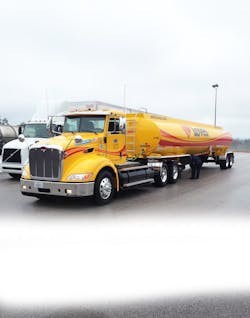A s Love’s Travel Stops expands its natural gas offerings at locations around the country, it is fulfilling one of the biggest needs for any fleet looking to adopt natural gas—infrastructure. Love’s, parent company of Gemini Motor Transport, is now in position to take advantage of that built-in infrastructure itself through the deployment of compressed natural gas vehicles within the Gemini fleet.
Gemini first tested CNG in November 2012, utilizing the Cummins Westport 9L engine. Hauling 80,000 lbs. of gasoline and diesel, though, left the trucks a little underpowered, says Kevin Ferguson, manager-natural gas marketing. “The 9L did okay, but we probably wanted a little more power,” he says.
Gemini’s fleet of 470 trucks is manned by 770 drivers, many operating in a slip-seating operation. It provides gasoline and diesel deliveries to its travel stops. In 2013, the fleet, which was started in 2001, delivered 429,457 loads and traveled over 53 million mi. The fleet is primarily Freightliner models, but it has started buying Peterbilt tractors and is also testing two each of Volvo and Kenworth models. Trailers are mostly MAC and Beall tanker models.
While that first beta engine test showed some positives, it was the introduction of Cummins Westport’s ISX 12 G CNG engine that got the ball rolling downhill for Gemini. The company has ordered 50 CNG-powered trucks (25 Freightliner and 25 Peterbilt) with plans to add more as it builds out the infrastructure at its travel stops, where all the vehicles fuel, says Brent Bergevin, director of transportation.
The 12L engine uses a spark-ignited “stoichiometric” combustion process with cooled exhaust gas recirculation technology developed by Cummins partner Westport Innovations.
All of the natural gas trucks are purchased through Rush Peterbilt or ATC Freightliner. The dealers will handle truck maintenance, Bergevin says, with Cummins network facilities also providing engine support as needed. This has helped keep costs in line as Love’s has not had to retrofit facilities to work on natural gas.
The trucks have fit nicely into Gemini’s operation, says Ferguson. “This is very much an ideal situation; it’s regional haul with high-truck utilization,” he points out.
In fact, Bergevin says payback on the vehicles will be quick, despite the price premium. “The models and [financial numbers] we run show we will have about a one-year payback and save roughly $1.75/gal., even though [the tractors] cost $60,000 more and we lose roughly 15% mileage on them [compared to diesel models],” he says.
There was an initial engine issue, but the problem was quickly resolved, says Bergevin. Both the Peterbilt and Freightliner models have sufficient power to handle the tasks they are assigned, although Bergevin says that performance and cost are just two of the metrics Gemini will monitor going forward.
Gemini replaces about 25% of its fleet each year, but how quickly additional CNG tractors will be added depends on several factors, Bergevin says, including performance and infrastructure growth within the Love’s network.
Love’s big advantage, though, comes from its own in-house infrastructure. The company is in the process of adding CNG fueling to its fuel stops, so the addition of CNG tractors to its private fleet comes without some of the added costs in the form of fueling stations other carriers experience. Combined with the high truck utilization, CNG is proving to be an economically and environmentally sound decision for the Gemini fleet.
